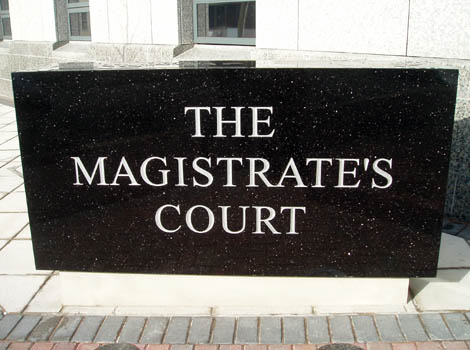Today marked the end of court week experience. I must say I have come out of this week more informed and educated about how the court system works in South Africa but also highly disappointed and shameful about the justice system in this country.
My last day in court was by far the most touching yet eye-opening day I have had in a long time. I sat through district court and met an attorney who was friendly enough to take me down to the holding cell for underneath the court where prisoners are kept until they appear in court.
I learnt that these prisoners who have committed less serious crimes such as theft of consumer goods, robbery and assault. I mean less serious in comparison to the more serious crimes such as rape and murder.
The holding cell
I went down to the holding cell and I was taken aback by the mere appearance of the cell. It was very cold firstly and considering it was winter it was even colder. The walls were dull grey with paint coming off it, there was a wooden bench on the side of the wall for the prisoners to sit and they were closed in by a squeaky metal gate. There were at least 10 to 15 prisoners who were transported from Sterkfontein prison and Sun City prison.

The treatment of prisoners
The constable had told us that everyday at least 1000 prisoners were transported to the courts for their hearing. Sometimes there are not enough buses to bring all the prisoners to court to appear and they are left behind and unable to appear in court and are left in custody until the court postpones their case.
I learnt that the prisons in Sun City were full. A prison cell which is made for 42 prisoners, have over 100 prisoners in them. I learnt that people who commit theft, robbery or assault are kept in the same prison cell as the murderers and rapists. There is no separation.
An older looking man walked to the stand in court to appear for his trial, which was postponed, had tears running down his face as he explained what was waiting for him after his trial was postponed.
He spoke out and told his interpreter that he would like to address the court. He told the court that he did not want to go back to prison because he is going to sleep on the cold cement floor tonight with no blankets and pillows. He is not going to eat because the other cell dwellers who have been there longer than him bully him into paying them after they steal his meal. He said they are forced to pay R50-00 in order to get their food and sometimes he does not even eat because he does not have money to pay them. The man who was expressing real emotion in court in front of everyone said they are treated like animals, they do not have a voice to speak out for themselves and he was dreading going back there tonight and staying there until he has to appear in court again.
The courts response
The court was not too interested in this man’s testimony and told him that we as tax payers pay for you to be in jail and therefore you do not have to pay for food and that you should speak out for your rights, he was then escorted out of court back to the holding cell.
Two observations can be deduced here. One, that he was intolerably dismissed by the court and second that the prison system in the country is not efficient.
He appeared in court just to hear that his case is postponed and he will remain in custody. This judgment happens at least 10 times in court on any given day. So it is basically a waste of time.
In this court there was a specific case where a case was postponed because the court did not provide a relevant interpreter for the accused and therefore she could not understand the court proceedings without someone who would translate it for her. The defense attorney voiced his displeasure about this. He said that the state is taking this issue of translators very lightly and therefore have failed to provide the relevant interpreters for the accused and because of this; the accused should not be punished for it. What does this say about the constitution of South Africa? A citizen of the country cannot even get an interpreter in her own language and has to face further costs when her case is postponed because of the states lack of responsibility.
I think a criminal should be punished because they have committed actions which go against the law of the country. However, I feel punishment needs to be set out in degrees. I also think that the efficiency of the court procedures in South Africa is strained and inefficient.
Conclusive thoughts
My court week experience was moving and it also proved to me that you are unaware of the way the povertised live, you are unaware of the problems in the justice system of the country and you are unaware of the lives of others until you experience it for yourself. I learnt that it is easy to sit back and judge criminals without considering their circumstance and the lack of education. Education makes you wiser and that has been proven many times in court last week. I think that the first step for South Africa is to address the low rate of literacy in the country; this would be a step in the right direction.

